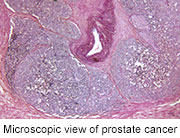
WEDNESDAY, May 13, 2015 (HealthDay News) — A new study suggests that adding radiation therapy to hormone therapy improves the chances of survival for men with prostate cancer that has spread to nearby lymph nodes.
Hormone therapy for prostate cancer blocks testosterone’s stimulation of tumor growth.
For the study, researchers used a database that included 3,500 American men diagnosed with prostate cancer that had spread to nearby lymph nodes (node-positive cancer) between 2004 and 2011. The research team found that 32 percent received hormone therapy only, 6 percent received radiation therapy only, 52 percent received hormone therapy plus radiation, and 10 percent received neither treatment.
The investigators then focused on 318 patients treated with hormone therapy alone and 318 who received hormone therapy and radiation therapy. The five-year death risk among those who received the combination therapy was 50 percent lower than among those who received hormone therapy alone, the findings showed.
The study was published online May 11 in the Journal of the National Cancer Institute.
“It appears that more aggressive local management of prostate cancer confined to the pelvis can offer more durable disease control, prevent the disease from spreading further and, for some patients, even provide a potential cure,” senior study author Dr. Jason Efstathiou, of Massachusetts General Hospital’s Cancer Center and department of radiation oncology, said in a hospital news release.
“Optimal management of prostate cancer that has spread to regional lymph nodes remains largely undefined, and our finding that nearly half of such patients may be undertreated despite being at a high risk for cancer death suggests that re-evaluation of current practice guidelines may be warranted,” added Efstathiou, who is also an associate professor of radiation oncology at Harvard Medical School in Boston.
More information
The American Cancer Society has more about prostate cancer.
Copyright © 2026 HealthDay. All rights reserved.

